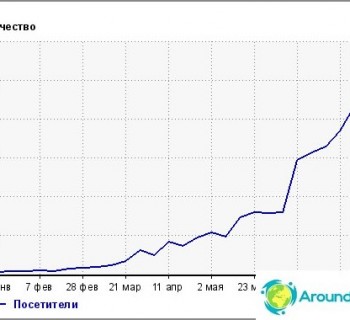Guest about Costa Rica. I asked my acquaintances to tell them what it is like to live there, whether it makes sense to go for the winter, what is the climate, what are the prices for everything about everything. In general, these are typical questions that concern winterers and emigrants. Yes, yes, you can also emigrate there, but the guys will not tell about this, since they went just for a while. Maybe someone else will tell you later 🙂
The content of the article
- one About Us
- 2 Pros and cons of living in Costa Rica
- 3 Living and wintering in Costa Rica
- 4 Traveling with animals
About Us
We've been creepy couch potatoes for most of our lives. We started traveling 5 years ago, after our daughter was born. Later, in Thailand, our son was born. He celebrated his first year in Cyprus, and his second in Costa Rica. We spent the entire last year away from home, traveling. First we lived in Spain, Italy and the Czech Republic, watched Europe, and then flew from Frankfurt to Costa Rica. We lived in this wonderful country for 4 months with two children 4.5 and 2 years old and two cats. The first month was a real pura vida among the green hills (pura vida is the motto of Costa Rica, literally «pure life», but the meaning is closer to «life is Beautiful!»). Then the stamp at the entrance expired, and it was decided to go to Panama. There we were drawn back to Costa Rica, even then she sunk into the soul with her amazing nature, climate, friendly and benevolent people.
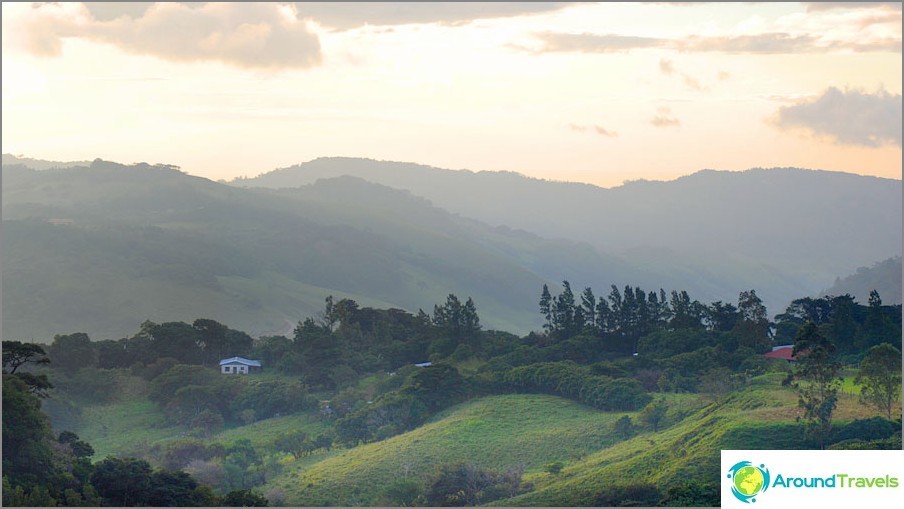
Pros and cons of living in Costa Rica
The decision to live in Costa Rica was spontaneous, it just coincided. We thought about wintering in a warm country, and Thailand, which we love so much (we have wintered there twice, having lived in Phuket for almost a year in total), seemed too familiar and cozy, we wanted something new. At that time, Ben, a student from the USA, came to us on couchsurf. He studied Spanish and traveled to many countries in South and Central America. Ben advised us to visit Costa Rica. At the same time, visas for Russians were canceled. Then I accidentally came across an advertisement for the airline Condor with inexpensive air tickets from Frankfurt. And finally, I found a wonderful home on Airbnb among the green untouched hills ... We decided.
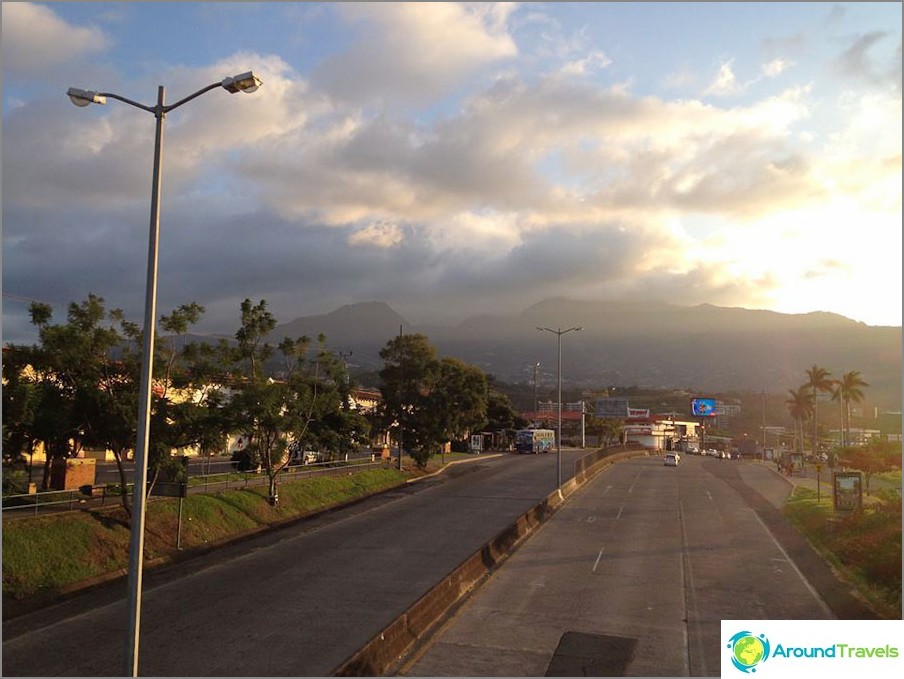
In our experience, there are pros and cons to living in Costa Rica.
Minuses
- Not cheap - this is probably the only serious drawback of Costa Rica for me at the moment. Neighborhood with the USA affects. And Canadians also love to relax and live in Central America. This significantly inflates prices for both housing and food..
- The second minus is the relaxation and non-obligatory nature of local residents, which is typical for Latin America. If something is not done, you cannot count on a quick fix.
- Not as safe as in Thailand, for example. Barbed wire and broken glass can often be seen on fences. Although there are many expats in the country, i.e. there is no special crime in fact now. Some thievery and dishonesty to one degree or another is characteristic of the inhabitants of all countries of Latin America. This also applies to local offices, even large ones. So you better not relax.
Regarding safety, many people scared us that children could be kidnapped and robbed right in the middle of the street. In fact, I got the impression that San Jose is pretty safe. Many police officers, few shady personalities. After 10:00 p.m. we never really walked.
Once we left 4 pairs of crocs we just bought in the supermarket, half an hour later the bag was in the same place. Once again, the credit card was accidentally handed over to the wash, it was returned to us in a separate plastic bag, slightly worn, but working. There were no subsequent incidents of cash withdrawals from this credit card. In general, I would feel completely safe if it were not for the warnings, tall fences with barbed wire, armed guards at the entrance to the bank (one on each side of the entrance), metal detectors in buses and guarded playgrounds.
- Poorly developed (in comparison with Europe) urban infrastructure, some general provinciality and parochialism. The country has chosen eco-tourism and wildlife conservation as a vector of development, therefore, there is not a lot of cultural life on a global scale and other delights of civilization here. The assortment of goods is also not the richest..
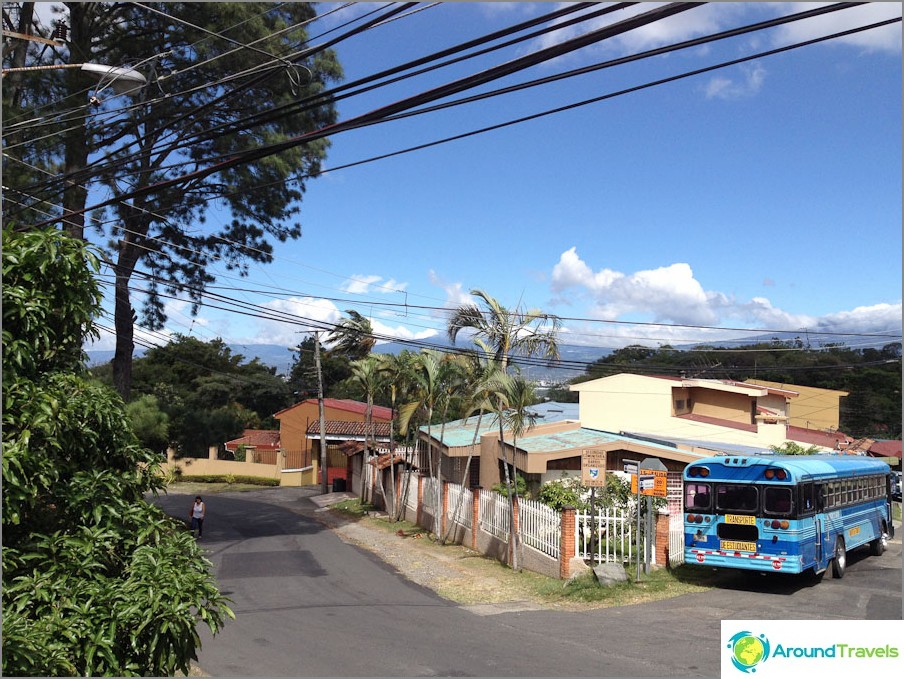
pros
- Ecology, very beautiful and rich nature. Costa Rica's motto is pura vida. This country has relied on eco-tourism, the cultivation of organic fruits and vegetables, and farms. Costa Rica, on the one hand, is very agrarian, rural, on the other, it is focused on tourism, and mainly from the USA. There are many nat. parks, reserves. All sights are mostly natural. Lots of places to visit. There are also coasts with deserted beaches and warm water and waterfalls and rain forests and mountains and volcanoes.
- The friendliness of the local people. Despite the fact that the crime situation in the country is not very good, people on the streets are very friendly and smiling, open.
- Nice climate. Despite the fact that Costa Rica is quite small in size, it accommodates many climatic zones. There are hot tropical coasts and highlands with eternal spring and coolness..
- The language of the local population, not difficult for Europeans and widespread in the world, is Spanish. At the same time, the country is focused on tourism, so many people understand English too. Unlike neighboring countries, where it is almost impossible to communicate without Spanish, and from the countries of Southeast Asia, where, without knowing the local alphabet, you cannot even read a sign on the street.
In general, Costa Rica is suitable for those who want to live in harmony with nature, value environmental friendliness and cleanliness, positive people, silence and solitude..
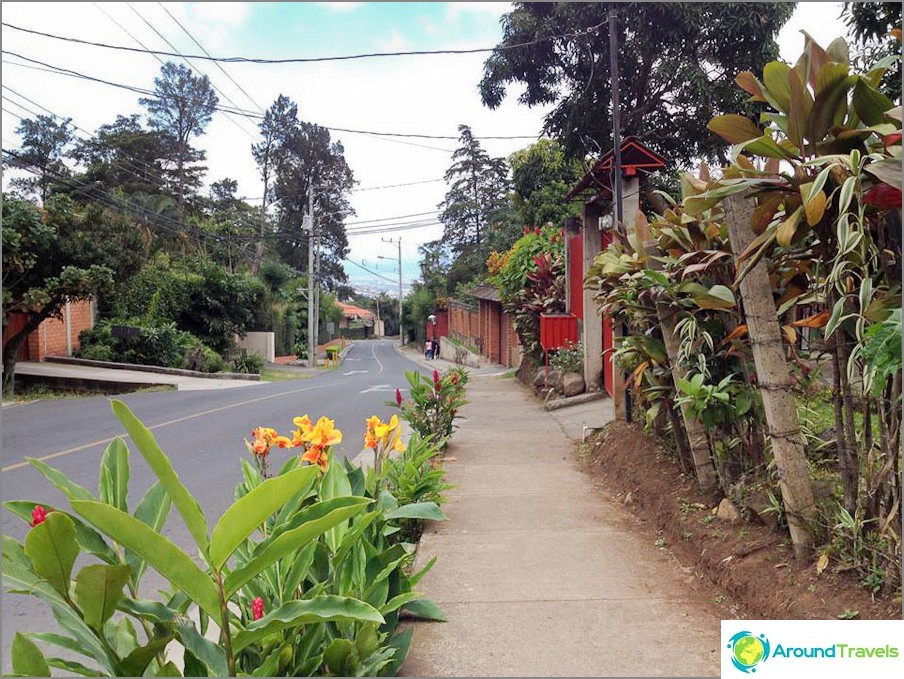
Living and wintering in Costa Rica
Visa issues
According to the recently changed rules, for Russians in Costa Rica, entry for up to 30 days on the stamp, after the expiration of the period, can be extended up to 90 days. You can also enter Costa Rica with a valid visa to one of the EU countries.
We had a visa, but it expired in 5 days. After reading the forums that, according to the rules, they require you to show a return ticket at the entrance, we ordered them from the local airline Avianca (since the tickets were fully returnable, we were not embarrassed by the price of a thousand bucks ... well, then they butted for a long, very long time to these crooks returned the money to us and, as a result, six months later, when they returned to Russia, they finally returned the money. The airline itself did not seem to be going to return this money).
Upon arrival, no one asked for return tickets - this is at the discretion of the border guard. And even if he asked, they are not checked in any way, everything that looks like a ticket will do. When re-entering Costa Rica, from Panama, return tickets were not checked again - families with children are treated differently there, they make all kinds of concessions and concessions.
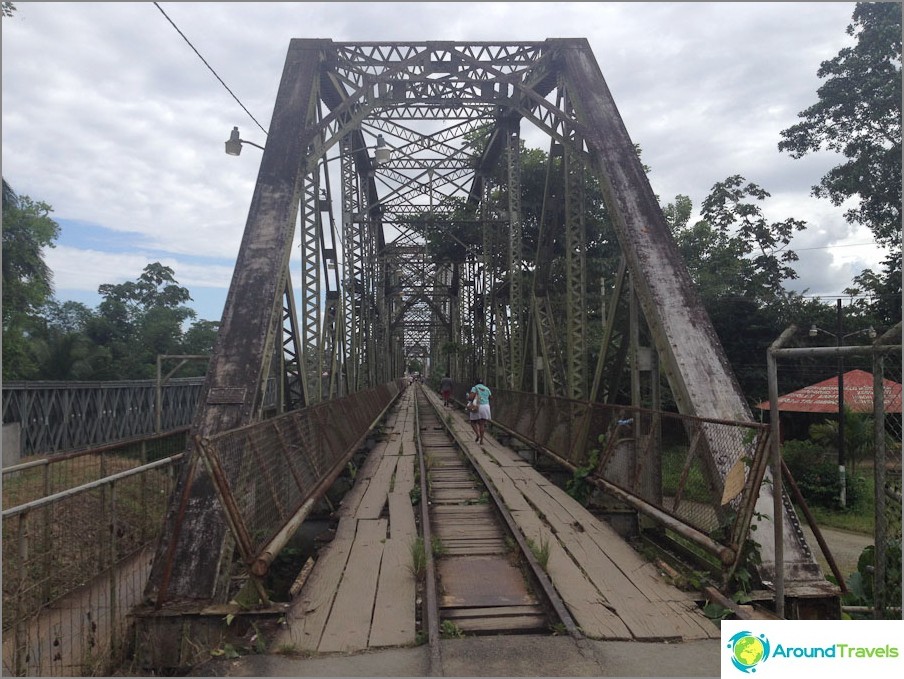
It looks like the border of Panama and Costa Rica
Although the decision to abolish visas for Russians has been officially published, in reality no one knows anything and the officers act rather at their own discretion. As already mentioned, now for Russians in Costa Rica, entry is visa-free for 30 days. But the first time we were stamped for 40 days, and on the border with Panama, for the second time, for 90 days..
For citizens of the USA / Canada and other decent countries, a 3-month stamp is put at the entrance, which can be extended for another 3, so there are few people who care about the issue of visas. Citizens of the Russian Federation, after the expiration of the first term, in theory, can extend the stamp in immigration for another 2 months (we did not use this, whether it really works - the question is). To make a visaran, you need to leave for at least 3 days, but you can endlessly visit, and in Nicaragua (the easiest option), in principle, it should not be very expensive, maybe 60 bucks for a round trip (you can see the bus prices here: http : //www.ticabus.com/.
For an overstay of 100 bucks for each month, but no one really knows what to do, if less than a month - we had an overstay for 12 days, they didn't even ask about it at the airport.
Climate
The climate in Costa Rica is wonderful. On the coast - tropical, humid and hot, there we were only passing through (on the Caribbean side). Much like Thailand, but much less secure. In the capital, San Jose, at night +18 C, in the daytime +25 ... +30 C, there are strong winds and even chilly. It is generally cool in the mountains - eternal spring. It's warm during the day, cool and fresh to sleep at night. It does not rain in San Jose from November to March approximately, it still pours in the mountains.
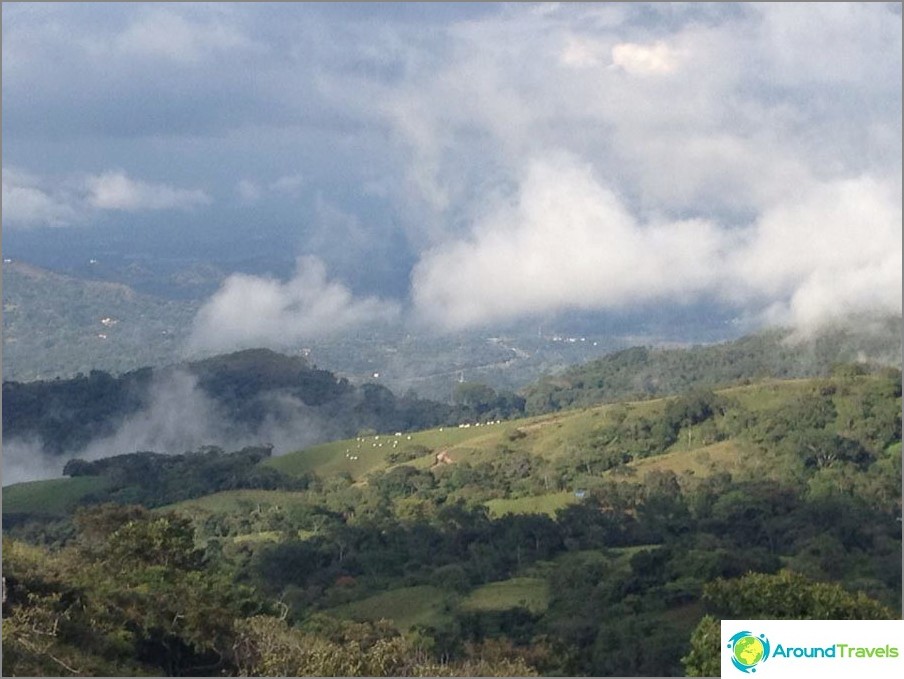
Local population
Costa Ricans call themselves tico or tica, depending on gender. They love and accept such a name for themselves, there is even a stable concept of tico style and there is, for example, a specialty cheese «tico».
They are very positive and welcoming to children. Everywhere locals walk with babies, they are always in the arms of mothers and fathers, there are practically no strollers (but you don't really go there, there are hatches open, sometimes there are no sidewalks).
Tiki live in families, in their homes. As a rule, there is a lot of land around the house. Trees, grass, all kinds of pets, there is where to run for children. Adults do not need to entertain children separately, they find something to do on their own. Rustic lifestyle.
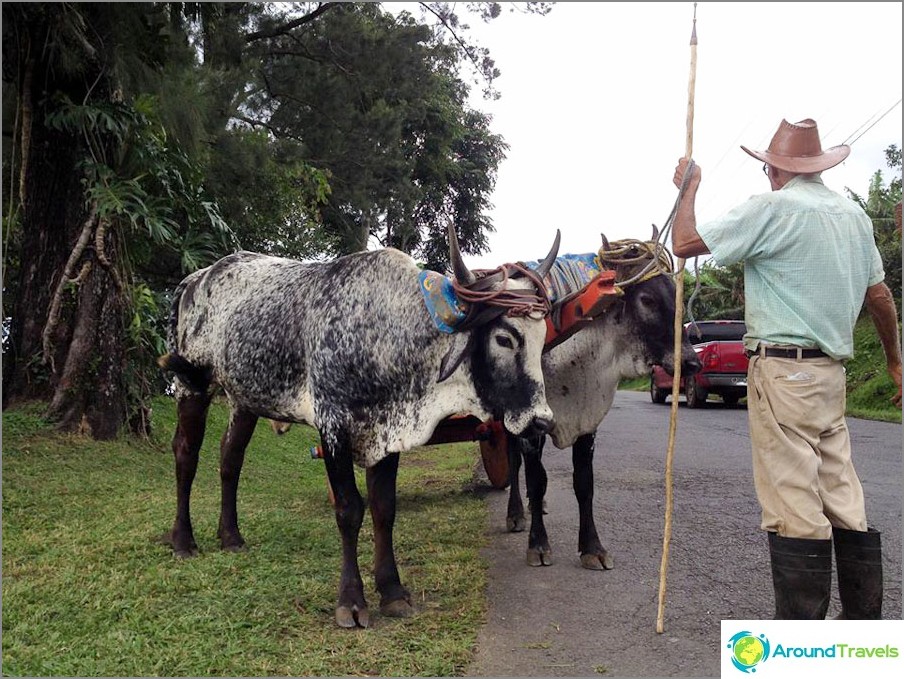
All people are very, very nice and open, they always say hello, if you look at them, they always smile at you and the children. Our children became very sociable after the winter in Costa Rica, before that they were more enslaved, they smiled less. In Costa Rica, the bus always gave us a seat. But in the Czech Republic, for example, we did not concede, we often rode standing. Yes, even in San Jose there are the sweetest and nicest taxi drivers that I have ever met..
It's funny that they recognize Russian on the street, they rejoice: «russo, mucho freeo» (Russian, very cold). In general, Russians are treated well, friendly.
Locals often behave directly, like children, all the emotions they have are all on their faces, and as a rule, emotions are positive. But those tics who lived in the United States, and then returned, they seem to be smiling, but they are always thinking something in the background and are soaring about something.
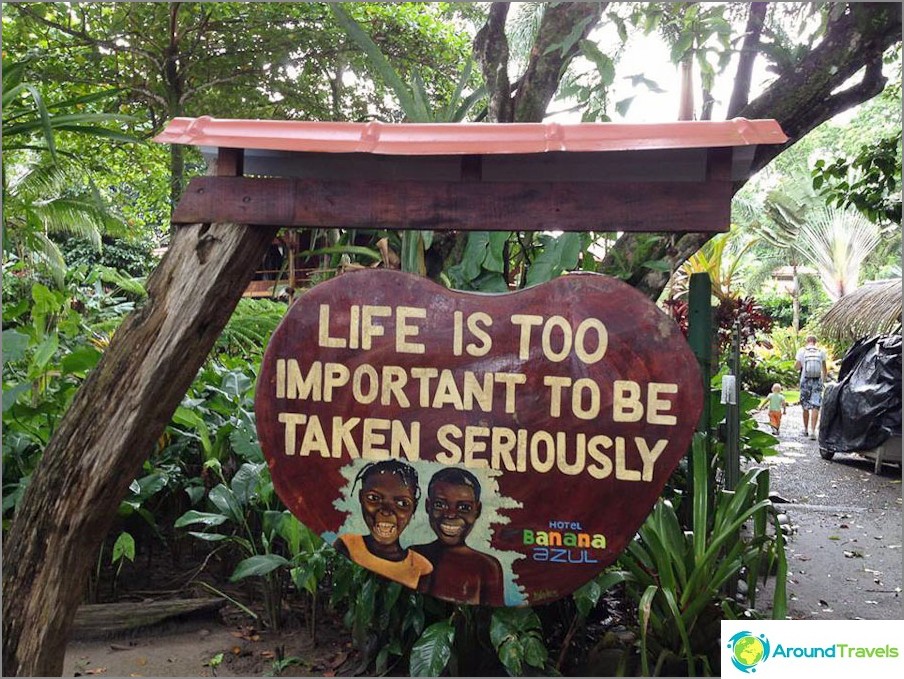
Products and prices
There are many shops dedicated specifically to «farangs». Everything is there, neat and beautifully arranged, especially for the expats. There are a lot of them in Costa Rica. Eco labels on many fruits and vegetables delight, insanely delicious strawberries, mango.
Milk is cheap because the price is regulated by the state and is the same in all stores: $ 1 per liter. Bread $ 1-2 per loaf, chicken $ 8, turkey leg $ 4, a kilogram of good processed beef $ 8, tomatoes $ 3-4, potatoes $ 3-4 (all prices are per kg). Bananas, coconuts, mangoes are cheap as in Tae. Avocados are insanely delicious, we ate them every day, about $ 1.2 apiece.
True, it’s a problem with bread, but it’s really a problem — they don’t know how to bake delicious, and the flour is so-so. There was only one shop where we bought delicious bread.
As for seafood, for example, the shrimp topic in Costa Rica has not been disclosed at all. In Tae there were several species on ice every day in Tesco, and in Costa Rica 1-2 species. Sometimes it is just cleaned, dumped in the refrigerator and looks well, not very fresh.
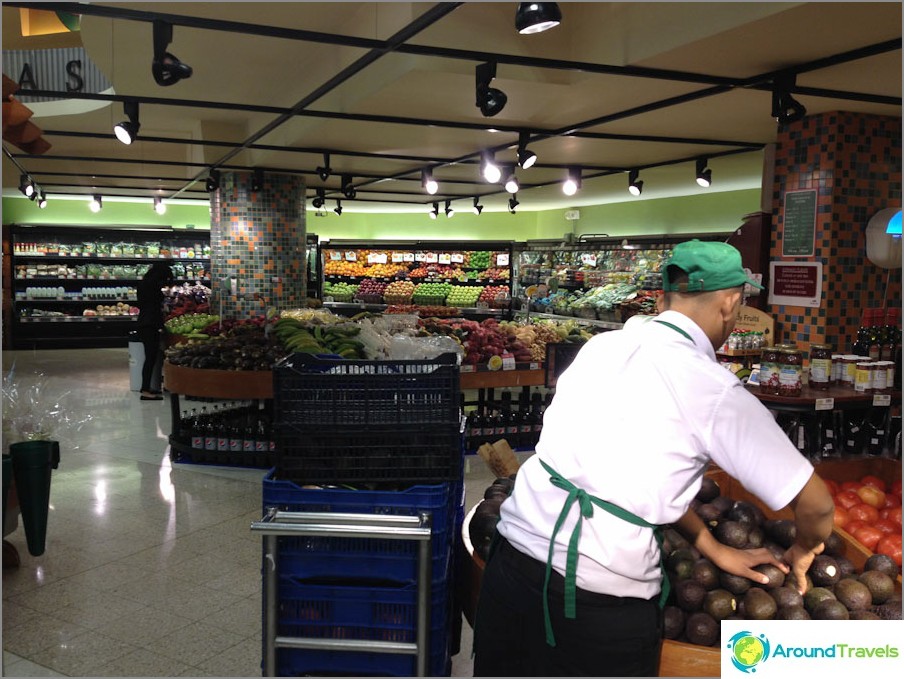

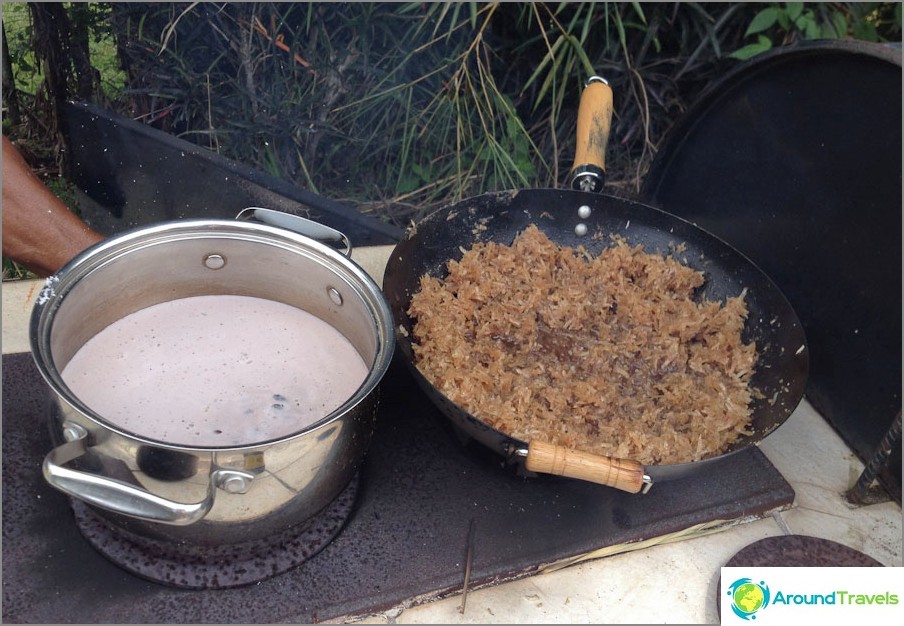
Costa Rican cuisine: fried coconut flakes and rice with beans in coconut milk
Our budget
Without denying yourself anything - 1200-1400 dollars per month for a family with two children + 2 cats.
True, food prices are not encouraging at all. This is also noted by residents of the United States who came to Costa Rica. They say it's cheaper to live with them.
By the way, in Panama there is not a damn thing at all, but anyway we spent 1000 bucks on food per month, so the high cost of food is a problem not only in Costa Rica, but in any tourist places close to the USA and Canada..
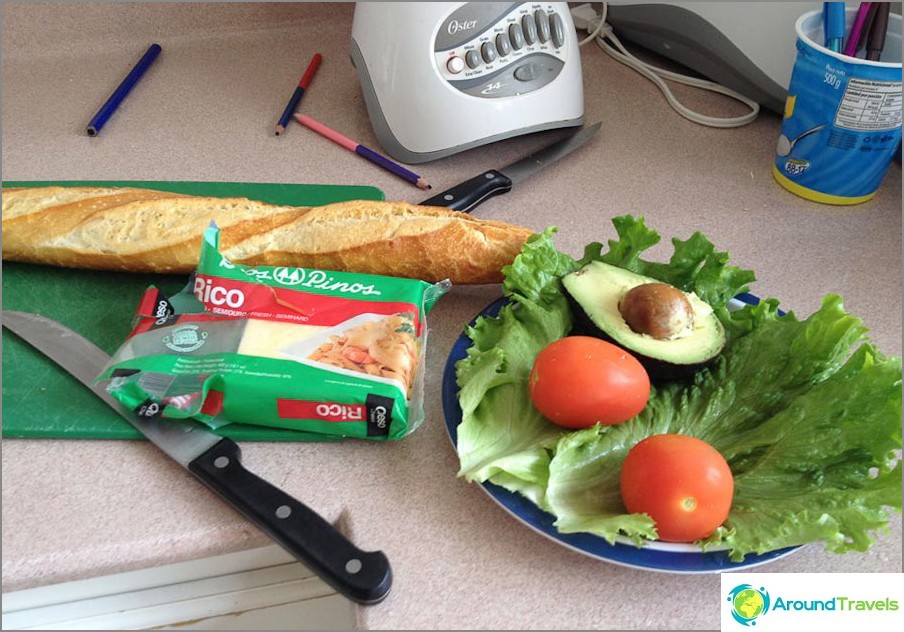
Lodging
It is not so easy for a family with children and cats to find housing, much depends on the initial contact with the owners. It happened that we did not expect anything good, but found warmth, comfort and a warm welcome. It also happened to cancel the reservation because the owners suddenly began to behave unfairly or incomprehensibly. We do not have special requirements for houses, during the whole time of travel, living conditions varied from a huge mansion, where it was difficult to count the number of rooms, to a small room in the house of a large noisy family with a dog..
We found the first accommodation in Costa Rica a few months before our arrival on Airbnb, here it is, $ 700 per month. We've tried other options, including an onsite search, but Airbnb is the best way to get a complete picture of future accommodations and future hosts. There was a time when we renewed the lease in person after the Airbnb contract ended and the attitude of the hosts changed dramatically for the worse.)
It was a cute double cottage with homemade bamboo furniture. He stood alone on a high hill and delighted with stunning views of untouched nature from the windows, especially the sunsets, when the lights of San José lit up in the distance. Life stopped, I wanted to admire all this endlessly, and also - to wander around the surroundings, enjoy the swift hummingbird, watch the fog descend from the mountains, then to burst into a downpour.
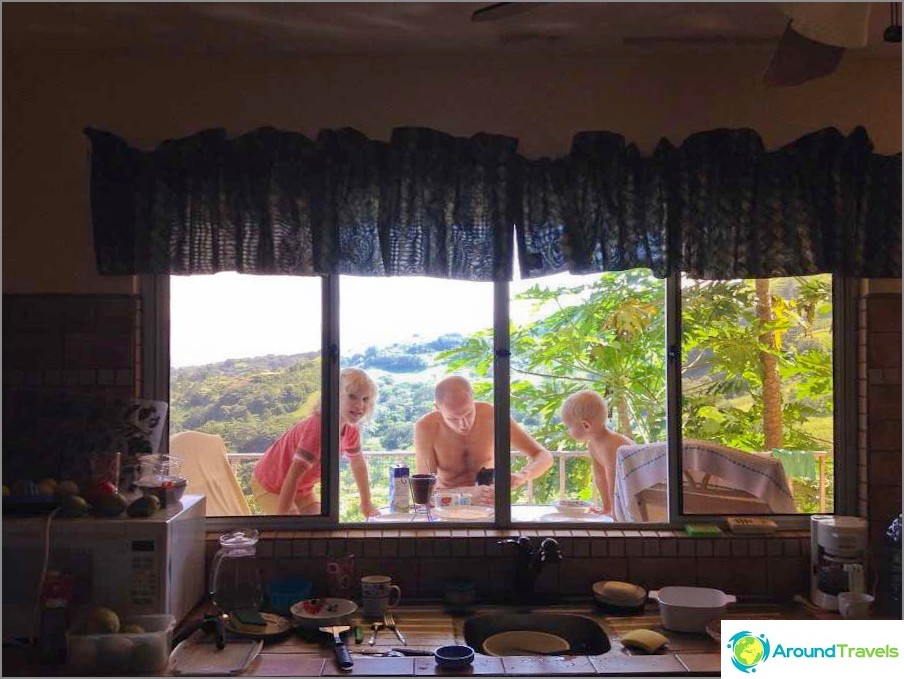
During a trip to Panama, we missed civilization, so we settled right in San Jose, which doubled the price tag for housing. The capital of Costa Rica, San Jose, seems at first glance not the best place to live. However, the Escazu area where we lived was just lovely. We rented the top floor of a very funny house with a huge hanging bed, a bunch of different hammocks, and a hostess who had been fishing in Alaska for 10 years. It was surprising that in some 200 meters from the house civilization began, with bustle, shops, cars, but as soon as we returned to this house - only the murmur of a stream and squirrels jumping over the bamboo thickets, dragging unripe mangoes from the tree.
Our last accommodation was a condo with a pool and other benefits of civilization (their website is http://www.casareflejos.com/). We did not want to change the area, and this was the most expensive housing in our life, tailored specifically for expats. There was absolutely everything, including daily cleaning and laundry..
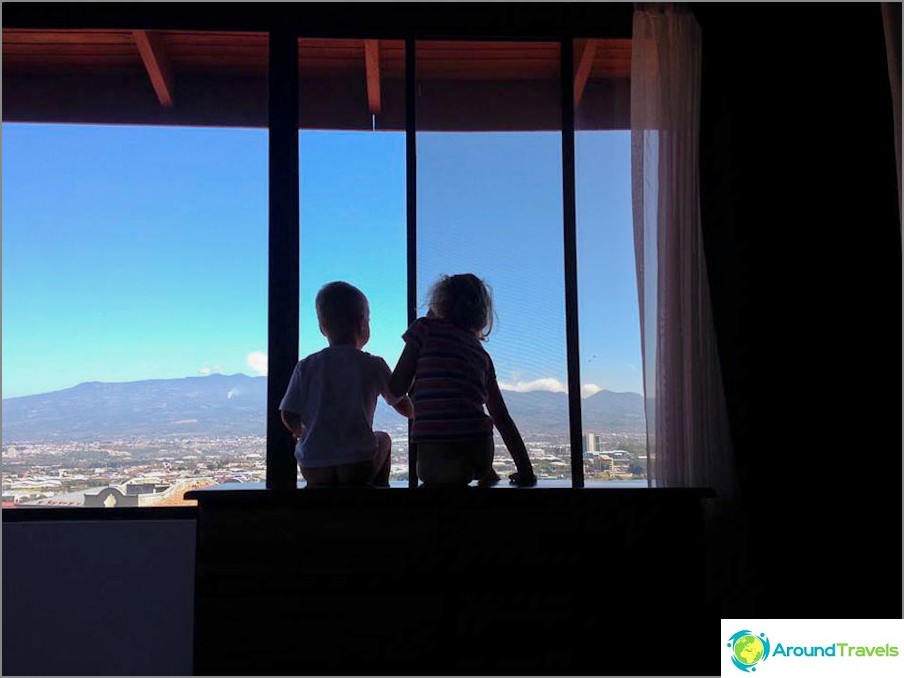
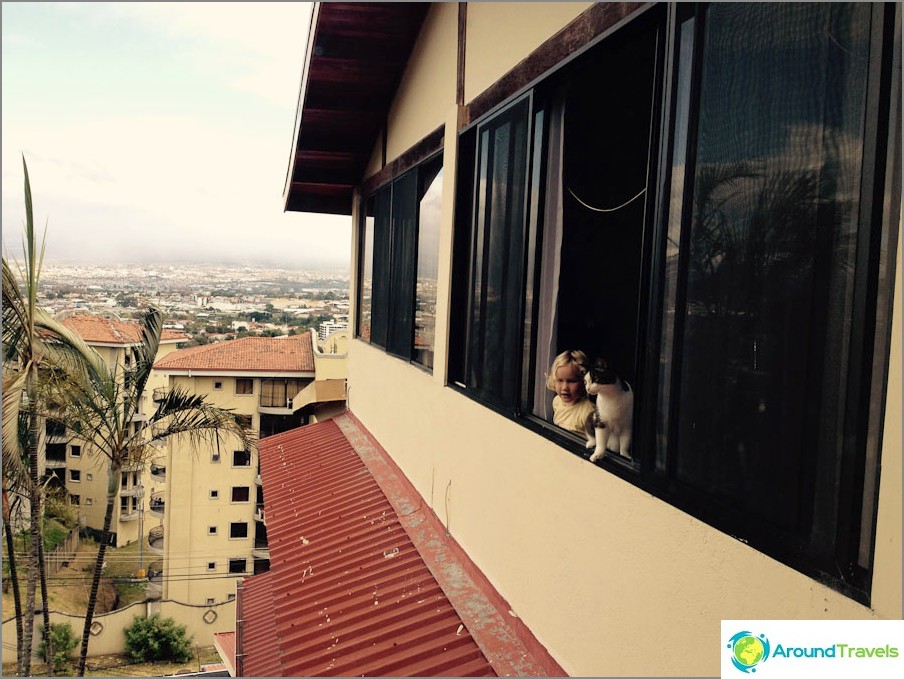
There are inexpensive housing in Costa Rica, and not a little, but closer to Christmas and New Year, everything is more or less decent dismantled. I have not seen so much anywhere “grandmother's houses”. As a rule, these are houses rented by local residents. The house itself will most likely not be new, something in it may not work, and it is unlikely that it will be repaired soon - tiki are rather frivolous people (and this, perhaps, is the recipe for their happiness).
Usually houses are not united into villages with a common fence, common area, security, etc. The site, if any, is separate, everyone has their own fence, high, high and always entangled with barbed wire (in some places under voltage).
The cheapest housing costs, probably, 400 bucks, the most expensive (like our last) - 1400, but the quality is worth it.
Everyday life
The houses are notable for their capital. These are not just concrete boxes, it is comfortable inside, there will almost always be ceiling fans in case of heat during the day, they like bar counters and make a kitchen with a large panoramic window - it is very pleasant to cook with such views.
For all the time, only small insects were eliminated from the house, but a scorpion crawled to the neighbors. They have an eco cabin, such as a wooden house, not capital, right in the middle of the wild.
Houses usually have aluminum windows, as a rule, mosquito nets are everywhere, even in cheap housing. We did not see mosquitoes in San Jose.
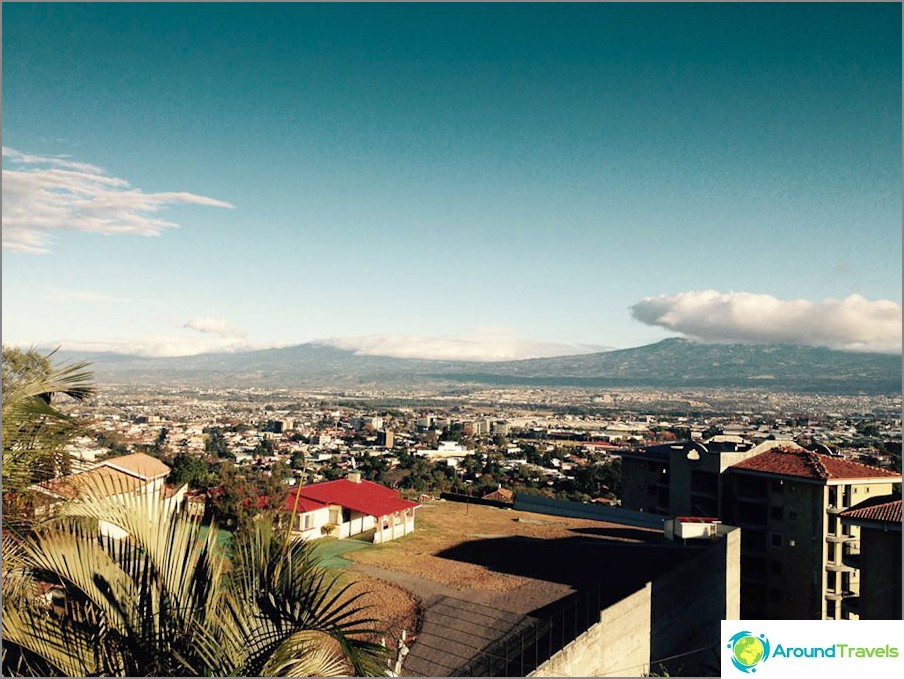
The water is central almost everywhere, they save on heaters, they will not be in cheap housing, there will be a tank on the roof. The sewage system is quite civilized. Where we were, nothing flows down the drain ditches.
Tiki thinks they have clean tap water. It is definitely suitable for cooking, but in my opinion there is a lot of chlorine. Although many tiki drink it just like that, so purchased drinking water is not cheap, 3-4 dollars for 5 liters.
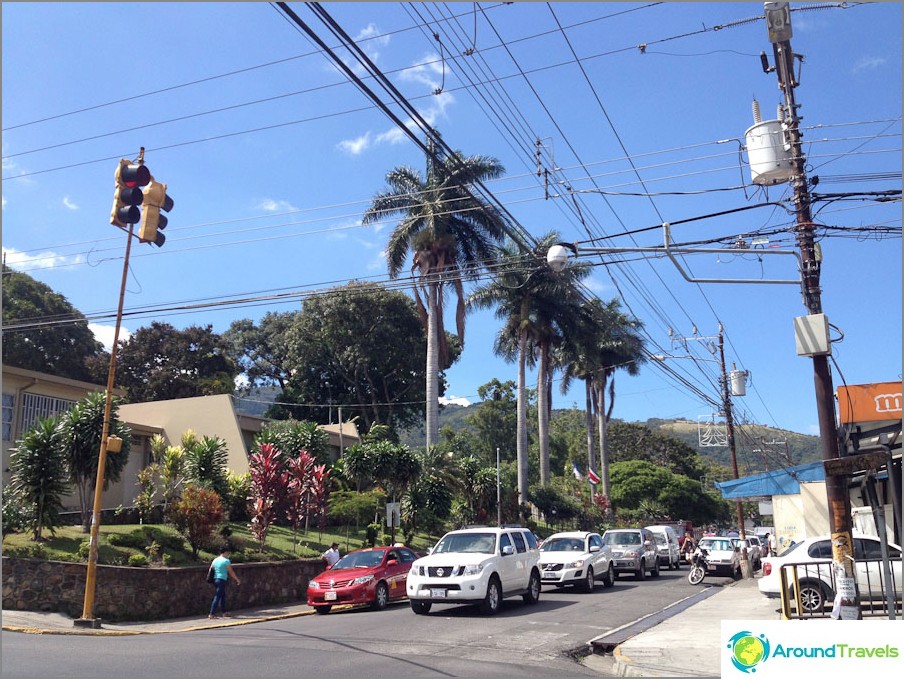
Entertainment for children
In Costa Rica, we walked a lot, in the hilly area it was a pleasure to do. A couple more playgrounds were nearby. Their old sites are reminiscent of ours - everything is iron, rough. But the new ones are put on wooden, cool ones. There are also entertainment centers, we went to the largest, Multiplaza, - there are 2 free playgrounds and always some kind of entertainment, such as pedal cars, trampolines and other things. Inexpensive: 1 bucks for a trampoline, 2 bucks for a huge circle on a pony.
In San Jose we went to La Sabanna City Park, we really liked it. Large in length, with a bunch of playgrounds, ponds, football and basketball fields, skate and roller courts, with pony and horse riding. There are many people there, but there is always enough space for everyone to have a picnic. And there are also eucalyptus trees - I caught a cold a couple of times, went there, lay around, breathed and everything took off as if by hand.
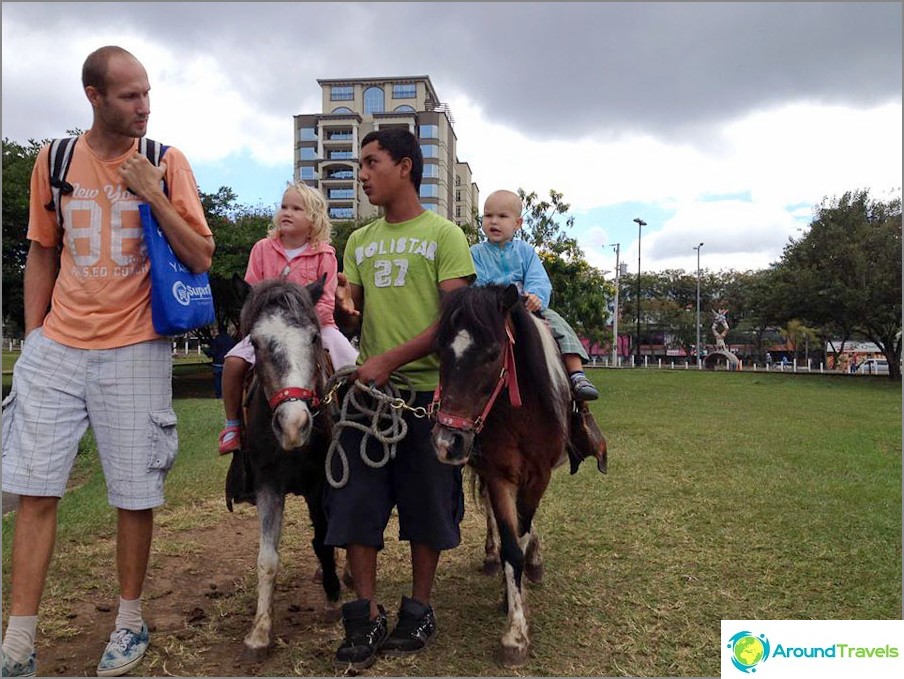
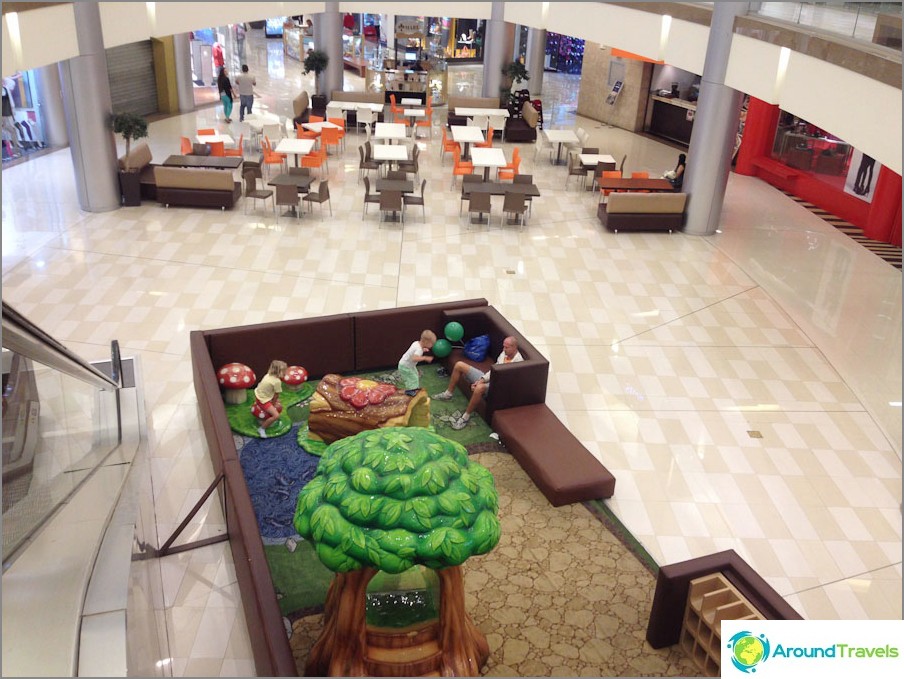
Traveling with animals
We paid 100 euros for an animal up to 6 kg at the Condor, in Europe we paid 50 euros per flight for each animal. Not very cheap, but not as a person either. According to the documents, the requirements in the EU are identical to the export of cats anywhere from Russia. We were released with the same papers from Russia. But then the difficulties already began, tk. it is not easy to fly back from Costa Rica to the European Union. You need a rabies test from an official laboratory (which Costa Rica does not have). Veterinary medicine takes blood for analysis, sends it to the United States, costs from 300 to infinity dollars per animal and wait at least a month. And that's not all: you need a heatlth certificate of a certain type, it costs 100-150 bucks per animal, depending on the arrogance of the veterinarian. Condor only required scans of the test, not the original. We paid only for the certificate, we did not do the test.
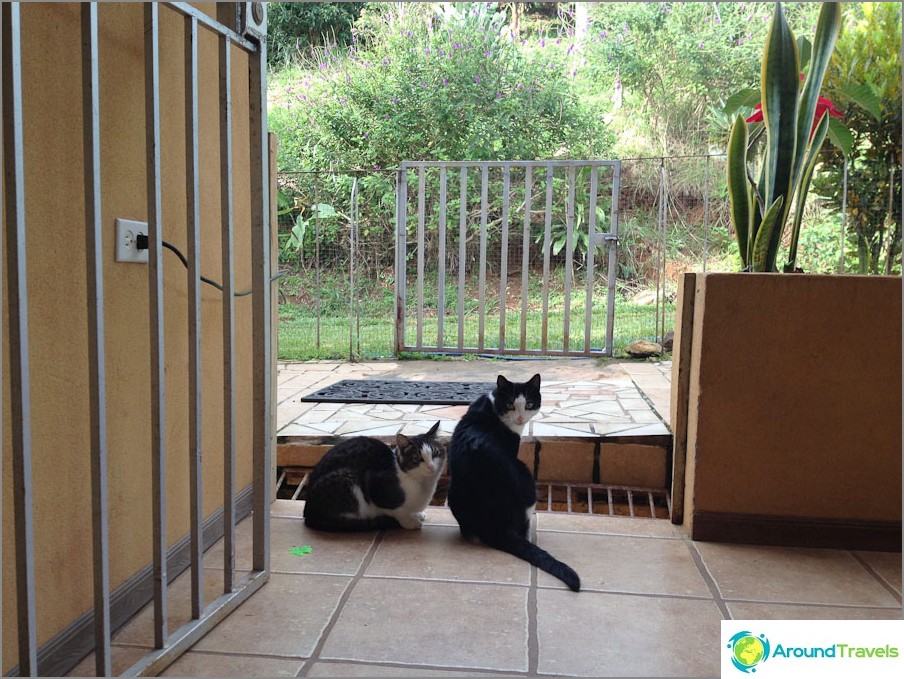
In general, in Latin America they fight for cats in full. We also phoned a bunch of bus companies to go to Panama with cats and only one was hardly persuaded to take us with the animals, from the rest - absolutely no.
In Europe, too, everything was different everywhere: the Spaniards are not even allowed into public transport with cats, the Germans can even get on the bus, even on the train, and it’s free and you don’t need any certificates, you can get on the train with the Czechs, you cannot on the bus and in Italy we were almost turned off for the flight, tk. they were not satisfied with plastic containers, there should be rag handbags and that's it. We loaded everything in soap, 5 minutes before departure, after the personal permission of the crew commander.
In general, in terms of transportation, traveling with animals is more difficult than traveling with children..
Olga and Sergey, with children Tanya and Denis.
